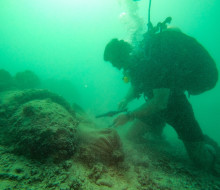
Second World War-era bombs in Vanuatu made safe by Navy divers
26 June 2024
Unfortunately you are viewing this website on an outdated browser which does not support the necessary features for us to provide an adequate experience. Please switch to a modern browser such as latest version of Google Chrome, Mozilla Firefox, Apple Safari or Microsoft Edge.
Ngā mihi nui
This year’s Anzac Day commemorations will be very special for Christchurch’s Corporal Ryan Johns, who is walking in the footsteps of a relative who served in the grim 1915 Gallipoli campaign.
Corporal Johns’ strong military heritage makes representing the New Zealand Defence Force (NZDF) at the services in Türkiye on 25 April extra significant, in particular at the Anzac Commemorative Site and also atop the sun-scorched heights of Chunuk Bair.
As far as the former Cashmere High Student is aware, it will be the first time anyone from his family has walked in the Anzac footsteps of his great-uncle, Harvey Johns, whose personal account of the Gallipoli campaign is one of the most vivid among those who survived.
“My father’s side of the family fought as Anzacs at Gallipoli, including Sergeant Harvey Johns, who was a sniper for the Wellington Battalion and fought at Chunuk Bair.
“Others were Graham Johns, who enlisted in 1915 as a rifleman in the New Zealand Rifle Brigade. He was transferred to the New Zealand Machine Gun Corps, serving in Egypt, France and England until returning home in 1917 on the [hospital ship] SS Marama. Another great-uncle, Kenneth Newman Johns, enlisted in 1918.
“On my mother’s side of the family there are many British officers. Many were killed while fighting on the Western Front during the First World War and many were decorated for their bravery.”
Victoria Cross-holder Captain Francis Octavius Grenfell was killed in action at the Second Battle of Ypres. Another relative, Captain Riversdale Nonus Grenfell, was killed during the Second Battle of Aisne.
Second-Lieutenant Gerald William Grenfell was killed at Hooge, in Flanders, while Captain Julian Francis Grenfell, a holder of the Distinguished Service Order, was wounded at Ypres and later died in hospital.
More than a century later, Corporal Johns is due to be a member of the New Zealand catafalque guard, which comprises four service people standing at the corners of the catafalque with their heads bowed and their weapons reversed as a symbolic form of respect for the fallen.
In this solemn task, Corporal Johns will be standing a matter of metres from where his great-uncle served with Lieutenant-Colonel William Malone’s famous Wellington Battalion on Chunuk Bair. Harvey Johns was severely wounded during the epic, no quarter battle that unfolded atop Chunuk Bair, having previously served in the front line at Quinn's Post; the most feared place in the Anzac perimeter.
“I am looking forward to representing my family as we recently lost my father, Steve Johns. It will mean a lot to the rest of my family.”
Corporal Johns’ first Anzac Day service was in Timaru in 2019 when four generations of the Johns family - all with military service - participated.
“That’s something we won’t be able to do again,” he said.
Corporal Johns, 36, went to Cashmere High School and on leaving became a tradesman. He joined the NZ Army Reserve Force before enlisting as a Regular soldier in 2018, joining the Royal New Zealand Infantry Regiment.
He is now based at NZDF headquarters in Wellington but has also served around the country, including working in Managed Isolation Facilities during the Covid-19 response. He was also involved in the Pike River Mine re-entry.
“I’ve been lucky to have many highlights so far. But being chosen to represent my country, the NZDF and also my family is a great honour.”
Most of the 40-strong NZDF contingent arrived in Türkiye about a week before the 25 April anniversary to acclimatise and rehearse before the ceremonies.
Battlefield tours were part of the programme so the members could learn more about their predecessors and the battles that were fiercely fought at Gallipoli.
Ahead of Anzac Day, the Gallipoli battlefields attract groups of Australians and New Zealanders but also thousands of Turkish people, including large numbers of school groups.
“Being able to stand in the trenches and follow the footsteps of my relatives has been a surreal experience, I can’t explain the feeling of connection it brought,” Corporal Johns said.
“To see children playing and laughing on the grounds where these brave men fought made me realise that it all was not in vain.”